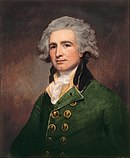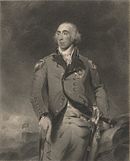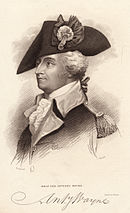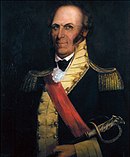
At the Battle of Brandywine on September 11, 1777 a colonial American army led by General George Washington fought a British-Hessian army commanded by General William Howe, 5th Viscount Howe. Washington drew up his troops in a defensive position behind Brandywine Creek. Howe sent Lieutenant General Wilhelm von Knyphausen's 5,000 troops to demonstrate against the American front at Chadd's Ford. Meanwhile, Lieutenant General Charles Cornwallis took 10,000 troops on a wide flank march that crossed the creek and got in the rear of the American right wing under Major General John Sullivan. The Americans changed front but Howe's attack broke through.
As Howe's wing made progress, Knyphausen converted his feint into a frontal attack on the American center. Washington's army was driven to the rear in disarray, but was saved from rout by Major General Nathanael Greene's rear guard action. Washington's army retreated to Chester, Pennsylvania while Howe occupied Wilmington, Delaware. The engagement took place in Chadds Ford Township, Delaware County, Pennsylvania.
British Army order of battle

General Sir William Howe (18,000)
Quartermaster General: Brigadier General Sir William Erskine, 1st Baronet
Note: Each brigade had two or four 3-pound or 4-pound cannons attached.
Left Wing
Lieutenant General Lord Cornwallis
- Unbrigaded:
- 16th Light Dragoons (200)
- Hessian and Anspach Jägers: Lieutenant Colonel Ludwig von Wurmb (500)
- Mounted Jäger company, Captain Richard Lorey (100)
- Artillery: 3rd Brigade
- Four 12-pound cannons & six 6-pound cannons

- Guards Brigade: Brigadier General Edward Mathew (939)
- Elements of 1st Foot Guard, 2nd Foot Guard, and 3rd Foot Guard Regiments
- 1st Battalion (488)
- Grenadier company, Lieutenant Colonel Sir George Osborn, 4th Baronet (124)
- Hyde's company (93)
- Wrottesley's company (91)
- Cox's company (90)
- Garth's company (90)
- 2nd Battalion (451)
- Stephen's company (88)
- Murray's company (89)
- O'Hara's company (87)
- Martin's company (91)
- Light company, Lieutenant Colonel Osborn (96)

- Light Infantry: (1,300)
- 1st Light Infantry Battalion, Lieutenant Colonel Robert Abercromby of Airthrey
- Light companies of (from left to right in formation) 5th, 15th, 22nd, 27th, 33rd, 38th, 42nd, 35th, 28th, 23rd, 17th, 10th, and 4th Regiments.
- 2nd Light Infantry Battalion, Major John Maitland
- Light companies of (from left to right in formation) 37th, 43rd, 45th, 49th, 55th, 63rd, 71st, 64th, 57th, 52nd, 46th, 44th, and 40th Regiments.
- 1st Light Infantry Battalion, Lieutenant Colonel Robert Abercromby of Airthrey
- Grenadiers: (1,400)
- 1st Grenadier Battalion, Lieutenant Colonel William Medows
- Grenadier companies of (from left to right in formation) 5th, 15th, 22nd, 27th, 33rd, 37th, 40th, 38th, 35th, 28th, 23rd, 17th, 10th, and 4th Regiments
- 2nd Grenadier Battalion, Lieutenant Colonel Henry Monckton
- Grenadier companies of (from left to right in formation) 43rd, 49th, 52nd, 57th, 64th, 71st, 63rd, 55th, Marines, 46th, 44th, and 42nd Regiments
- 1st Grenadier Battalion, Lieutenant Colonel William Medows

- 3rd Brigade: Major General Charles Grey, 1st Earl Grey (3,000 in 3rd and 4th Brigades)
- 4th Brigade: Brigadier General James Agnew
- Hessian Brigade: Colonel Carl von Donop (1,300)
- Linsing Grenadier Battalion
- Minningerode Grenadier Battalion
- Lengerke Grenadier Battalion
Right Wing

Lieutenant General Wilhelm von Knyphausen
- Unbrigaded:
- Queen's Rangers, Captain James Weymss (300)
- Rifle Corps, Captain Patrick Ferguson (90)
- 16th Light Dragoons (200)
- 71st Foot (1,200)
- 1st and 3rd battalions guarding the baggage train.
- 2nd battalion (350)
- Artillery: 1st and 2nd Brigades
- Six 12-pound cannons & four howitzers
- Hessian Brigade: Major General Johann Daniel Stirn (2,000)
- Erbprinz Infantry Regiment
- Donop Infantry Regiment
- Mirbach Infantry Regiment
- 1st Brigade: Major General James Grant (1,400)
- 2nd Brigade: Major General Grant (1,300)
- 5th Foot
- 10th Foot
- 27th Foot
- 40th Foot, Lieutenant Colonel Thomas Musgrave, John Graves Simcoe
- 55th Foot
American Army order of battle

General and Commander in Chief George Washington (12,000 regulars, 3,000 militia)
Main Body
- Unattached:
- Chadds Ford redoubt: Colonel Thomas Proctor
- 4th Continental Artillery Regiment: One 6-pound gun, two 4-pound guns, one 8-inch howitzer
- Light Infantry Corps: Brigadier General William Maxwell (1,000)
- About 100 soldiers were detached from each regular brigade to form this corps
- North Carolina Brigade: Brigadier General Francis Nash (1,094)
- 1st North Carolina Regiment, Colonel Thomas Clark
- 2nd North Carolina Regiment, Colonel Alexander Martin
- 3rd North Carolina Regiment, Colonel Jethro Sumner
- 4th North Carolina Regiment, Colonel Thomas Polk
- 5th North Carolina Regiment Colonel Edward Buncombe
- 6th North Carolina Regiment, Colonel Gideon Lamb
- 7th North Carolina Regiment, Colonel James Hogun
- 8th North Carolina Regiment
- 9th North Carolina Regiment
- Chadds Ford redoubt: Colonel Thomas Proctor
- Division: Major General John Armstrong Sr. (2,000)
- 1st Pennsylvania Militia Brigade: Brigadier General James Potter
- Philadelphia County Regiment, Moor
- Philadelphia County Regiment, McVaugh
- Bucks County Regiment, Maj. John Folwell
- Lancaster County Regiment, Col. James Watson
- Berks County Regiment, Col. Daniel Hunter
- York County Regiment, Col. James Thompson
- Cumberland County Regiment, Col. James Dunlap
- Pennsylvania Militia Brigade: Brigadier General James Irvine
- Philadelphia County Regiment, Lt. Col. Jonathan Smith
- Chester County Regiment, Col. William Evans
- Lancaster County Regiment, Col. Philip Greenwalt
- Lancaster County Regiment, Col. Alexander Lowry
- Northampton County Regiment, Col. David Udree
- 1st Pennsylvania Militia Brigade: Brigadier General James Potter

- Division: Major General Nathanael Greene (2,500)
- 1st Virginia Brigade: Brigadier General Peter Muhlenberg
- 2nd Virginia Brigade: Brigadier General George Weedon

- Division: Brigadier General Anthony Wayne (2,000)
- 1st Pennsylvania Brigade: Colonel Thomas Hartley
- 1st Pennsylvania Regiment, Colonel James Chambers
- 2nd Pennsylvania Regiment, Major William Williams
- 7th Pennsylvania Regiment
- 10th Pennsylvania Regiment, Lieutenant Colonel Adam Hubley
- Hartley's Additional Continental Regiment, Lieutenant Colonel Morgan Connor
- 2nd Pennsylvania Brigade: Colonel Richard Humpton
- 4th Pennsylvania Regiment
- 5th Pennsylvania Regiment, Colonel Francis Johnston
- 8th Pennsylvania Regiment
- 11th Pennsylvania Regiment, Colonel Richard Humpton
- 1st Pennsylvania Brigade: Colonel Thomas Hartley
Sullivan's Wing

- Division: Major General John Sullivan (1,100 less 1st Delaware & 2nd Canadian)
- 1st Maryland Brigade: Unknown commander (William Smallwood's brigade)
- 2nd Maryland Brigade: Brigadier General Chevalier Philippe Hubert Preudhomme de Borre
- 2nd Maryland Regiment
- 4th Maryland Regiment, Colonel Josias Carvil Hall
- 6th Maryland Regiment
- 2nd Canadian Regiment, Colonel Moses Hazen (400)

- Division: Major General Adam Stephen (1,500)
- 3rd Virginia Brigade: Brigadier General William Woodford
- 4th Virginia Brigade: Brigadier General Charles Scott

- Division: Major General William Alexander, Lord Stirling (1,500)
- New Jersey Brigade: Brigadier General William Maxwell
- 3rd Pennsylvania Brigade: Brigadier General Thomas Conway
Notes
- Footnotes
- Maxwell led the Light Infantry Corps and the sources did not list who led the New Jersey Brigade.
- Citations
- ^ Eggenberger, p. 59
- McGuire (2006), p. 172. The author gave British total strength.
- McGuire (2006), p. 183. The author listed the organization and strengths of the major units of Howe's left wing.
- McGuire (2006), p. 33. This brigade was drawn by lottery from the three foot guard regiments.
- McGuire (2006), p. 379. The author gave the Guards company organization and strength for September 12, 1777.
- McGuire (2006), p. 6. The author named the company commander Osborn.
- McGuire (2007), p. 234. Captain Thomas Twistleton led the light company but missed most of the campaign.
- McGuire (2006), p. 205. Osborn led both flank companies at Brandywine.
- McGuire (2006), p. 205. The author gave the light infantry organization and commanders at Brandywine.
- McGuire (2006), p. 205. The author gave the grenadier organization and commanders at Brandywine.
- McGuire (2006), pp. 138, 153. The maps show the 3rd Brigade's composition.
- McGuire (2006), p. 174. The map shows the 4th Brigade's composition.
- McGuire (2007), p. 154. The author listed the three grenadier battalions that fought at Red Bank.
- McGuire (2006), pp. 173–75. The author listed all details of Knyphausen's wing except Stirn's brigade and the 71st Foot.
- McGuire (2006), p. 244
- McGuire (2006), p. 244. The author listed Stirn's strength as 2,000 with 4 regiments.
- Johnson, p. 70. The author listed Erbprinz and Donop at Germantown.
- McGuire (2007), p. 154. Mirbach fought at Red Bank. The fourth regiment is unknown.
- Berchem, F.R. (1977). The Yonge Street Story: 1793–1860. McGraw-Hill Ryerson. p. 11. ISBN 0-07-082567-X.
- McGuire (2006), p. 169. The author gave the army's total numbers.
- McGuire (2006), p. 170. The author listed the commanding officer and the types of guns.
- McGuire (2006), p. 171. The author gives the strength only.
- Wright, p. 108. In July 1777 the nine regiments of the North Carolina Brigade numbered 131 officers and 963 rank and file. McGuire's listed strength of 1,500 was not used.
- Lewis, J.D. "Alexander Martin". The American Revolution in North Carolina. Retrieved May 2, 2019.
- Lewis, J.D. "Thomas Polk". The American Revolution in North Carolina. Retrieved May 2, 2019.
- Watson, Alan D. (1991). "Gideon Lamb". NCPedia. Retrieved May 2, 2019.
- McGuire (2006), p. 171. The author gives the militia's strength and leaders.
- ^ Harris, Michael (2016). Brandywine: A Military History of the Battle that Lost Philadelphia but Saved America, September 11, 1777. El Dorado Hills, CA: Savas Beatie. pp. 407–08. ISBN 978-1-61121-162-7 – via Book.
- McGuire (2006), p. 170. The author listed Greene's brigade commanders and total strength.
- McGuire (2007), p. 56. The author listed the regiments in the 1st and 2nd Virginia Brigades at Germantown.
- Wright (1989), p. 320
- McGuire (2006), p. 170. The author listed Wayne's brigade numbers and total strength.
- McGuire (2006), pp. 248–49. The author lists the two brigades' commanders and regiments.
- McGuire (2006), p. 171. The author listed the numbers of the detached 1st Delaware and 2nd Canadian, while giving the remainder of Sullivan's division only 1,100.
- McGuire (2007), p. 69. The author listed the organization of the two brigades at Germantown.
- McGuire (2006), p. 222. De Borre led the 2nd Maryland Brigade at Brandywine.
- McGuire (2006), p. 170. The author lists Stephen's brigade commanders.
- McGuire (2006), p. 197. The author counts the strength of Stephen's two brigades.
- Wright, pp. 283–98. The author gave the lineage of the Virginia regiments.
- Wright (1989), p. 322
- Wright (1989), p. 323
- McGuire (2006), p. 170. The author listed Stirling's brigade commanders.
- McGuire (2006), p. 197. The author counts the strength of Stirling's two brigades.
- McGuire (2007), p. 89. The author listed the brigade's organization at Germantown.
- Wright, pp. 255–58. The author gave the lineage of the New Jersey Regiments.
- McGuire (2007), p. 65. The author listed the regiments in Conway's brigade at Germantown.
- Wright (1989), pp. 324–25
References
- Eggenberger, David (1985). An Encyclopedia of Battles. New York: Dover Publications. ISBN 0-486-24913-1.
- Johnson, Curt (1975). Battles of the American Revolution. London: Rand McNally & Company. ISBN 0-528-81022-7.
- McGuire, Thomas J. (2006). The Philadelphia Campaign, Volume I. Mechanicsburg, Penn.: Stackpole Books. ISBN 0-8117-0178-6.
- McGuire, Thomas J. (2007). The Philadelphia Campaign, Volume II. Mechanicsburg, Penn.: Stackpole Books. ISBN 978-0-8117-0206-5.
- Wright Robert K. Jr. (1989). The Continental Army. Washington, D.C.: US Army Center of Military History. CMH Pub 60-4.
- Wright, Robert K. Jr. (1983). The Continental Army. Washington, DC: US Government Printing Office. ISBN 0-16-001931-1. Archived from the original on 2019-10-09. Retrieved 2011-11-06.